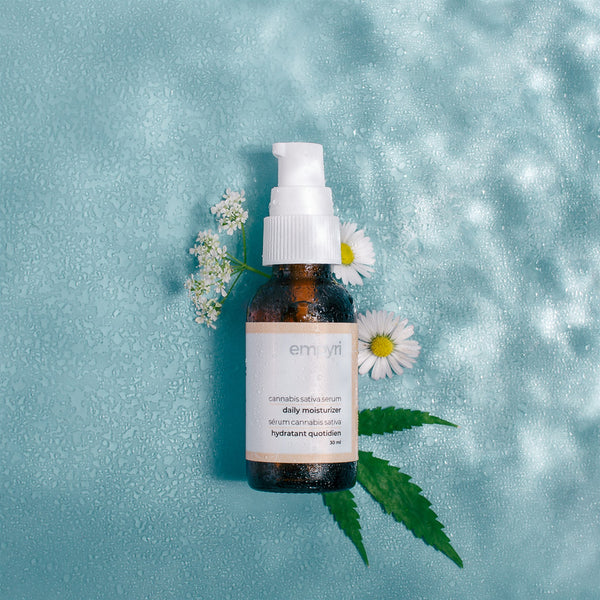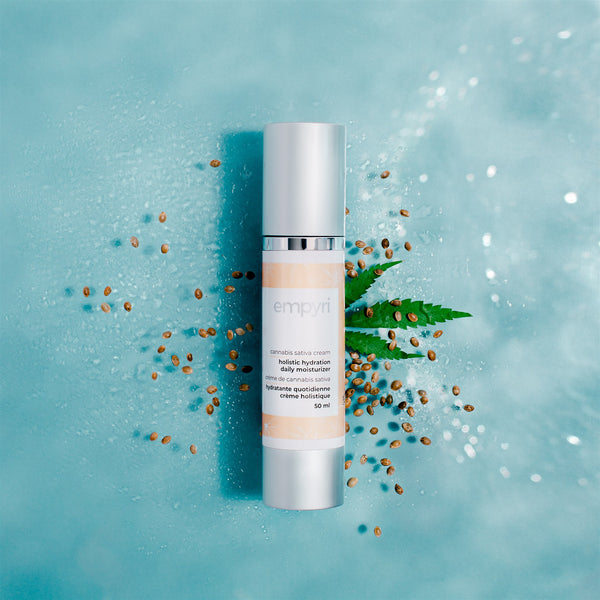Do all oils clog pores?
The quick answer here is no. Not ALL oils clog pores.
But we know you're here for more of the good stuff than that. There's a lot we can say about oils in skincare (even washing your face with them).
And we will! But first, a few basics.
Oil is essential to good skin health. That's why your skin has its very own oil, called sebum. It's a waxy substance produced in your sebaceous glands. Sebum's main job is to create a "coating" also known as your skin barrier that keeps moisture locked in and irritants locked out. Think of it like a two-way security guard.
In other words, your body produces oil to keep your skin hydrated. We know that hydrated skin is healthy skin, which is why we said earlier that oil is essential to good skin health.
We also know that sebum gets a bad reputation sometimes. Too much sebum production leads to what we know as an oily skin type. We're all striving for a glow, but not the greasy kind.
Yikes!
While some people with oily skin also struggle with acne, not all do. Why is this?
Sebum can clog pores when it is deficient in linoleic acid. We'll talk more about linoleic acids later but the point is that not all oils clog pores, even when it comes to your skin's own oil!
Regardless of your skin type, putting oils on your skin may be a frightening thought. The truth is that it is very difficult to create a 100% oil free skincare routine. And you likely don't need to!
All you need to do is continue reading to learn about which oils will and will not cause clogged pores so you can choose with confidence.
Comedogenic Oils Vs Non-Comedogenic Oils
Comedogenic oils are likely to clog your pores, whereas non comedogenic oils are not.
Many comedogenic oils are high in oleic acid. By contrast, non comedogenic oils are often high in linoleic acid. Why does this matter?
Acne prone skin is often low in linoleic acid, which is responsible for keeping sebum thin and runny so that it doesn't get trapped inside your pores.
The comedogenic scale is a tool that ranks oils based on how likely they are to clog pores. It looks like this:
- 0 - won't clog pores
- 1 - very unlikely to clog pores
- 2 - moderately low likelihood to clog pores
- 3 - moderate likelihood to clog pores
- 4 - fairly high likelihood to clog pores
- 5 - high likelihood of clogging pores
Now let's look at examples of comedogenic oils and non comedogenic oils to help you choose the right ones for your skincare routine.
Facial Oils That Do Not Clog Skin
The good news is that many natural oils do not cause clogged pores. Your choice will depend on your skin type and goals, as well as the type of product the oil is in. Let's take a closer look at some of the most popular non comedogenic oils.
Grape Seed Oil
Rating: 1
Grape seed oil is rich in antioxidants, vitamin E and linoleic acid.
It's known to help with acne scars and hyperpigmentation. If your skin does react poorly to grapeseed oil, another ingredient, although not an oil, which tackles these concerns as well as others is vitamin C.
We use grapeseed oil in our daily moisturizer. We love its high concentration of omega 6 to help strengthen the skin barrier. It also compliments our anti-inflammatory hemp roots by helping to calm redness from breakouts in acne prone skin.
Sunflower Seed Oil
Rating: 0
Sunflower oil is often used as a carrier oil.
What's a carrier oil?
Well, without getting too carried away...
Carrier oils have the job of transporting other oils (usually those higher in active compounds) into the skin. A good carrier oil resembles the skin's own lipids so that it can effectively absorb beyond the epidermis - or outer most layer of the skin.
So if their job is to transport or carry other ingredients, does it matter what characteristics they have? Not necessarily, but it's an added bonus when a product's carriers have skin nourishing benefits as well. This is the case with sunflower oil.
Sunflower oil is hydrating, soothing and again good for our skin barrier. It's a humectant and an emollient, which means it attracts water to the skin and keeps it locked in our skin barrier. (Unlike oil, we do want water to get trapped in our skin... hello hydration and glow!).
You may also know sunflower as a neutral cooking oil. It's "neutral" for skin too: suitable for sensitive skin and compatible with other oils and ingredients.
Neem Oil
Rating:1-2
Neem oil is popular in Ayurveda and beloved for its antioxidant and antibacterial properties. In addition to being non comedogenic, these properties make neem oil potentially beneficial for acne prone skin.
Unlike the other oils we've named so far, neem is an essential oil and has a fairly strong scent. We recommend a patch test before use and ensure its diluted and/or formulated with a gentle carrier oil.
Hemp Seed Oil
Rating: 0
Hemp seed oil is our favourite non comedogenic oil. No surprise here!
Not only does it not clog pores, hemp seed oil helps to unclog pores because it is high in linoleic acid. This is why the right hemp seed oil blend makes a good 2-in-1 makeup remover and face wash. Hemp seed oil is the perfect cleanser for acne prone skin.
Moreover, hemp seed oil has the ideal ratio of essential fatty acids - omegas 3 and 6. This is why it's known to be balancing.
You'll find hemp seed oil in all empyri products, including our hemp moisturizers and cold processed hemp soaps.
Sweet Almond Oil
Rating: 2
Sweet almond oil is very light on scent and heavy on hydration. It has higher levels of fatty acids and is helpful with scarring, irritation and UV damage. Anecdotally, sweet almond oil is helpful with psoriasis.
Sweet almond oil is starting to gain more popularity in skincare circles for giving the complexion a luminous glow!
Olive Oil
Rating: 2
We know olive oil from the kitchen. Just like it nourishes your body, it can nourish your skin, too. Olive oil is super hydrating, rich in essential fatty acids and great at combatting premature aging.
But if you have acne prone skin, steer clear. With a rating of 2, olive oil can be a bit too comedogenic for some skin types.
As an alternative, we use olive-derived squalene in our facial serum. It packs the same nutrient punch as olive oil but is lightweight and absorbs really effectively without clogging pores. Not all squalene is derived from olives; much comes from shark livers so make sure to investigate your labels for the vegan-friendly option.
Jojoba oil
Rating: 2
Jojoba oil is compatible with all skin types and especially beneficial for oily skin and acne prone skin. It's wax esters are similar to our skin's sebum which allow it to absorb effectively rather than sit on top of (and block!) pores.
Jojoba oil is full of vitamins A, D and E, plus antioxidants. It's very moisturizing and beloved not only for skin but for hair as well.
Overview
Natural oils offer our skin much needed moisture, balance, fatty acids and the list goes on. Before you choose your next facial oil, it's important to keep in mind which oils will potentially clog your pores and which ones will not.
When evaluating oils, anything marketed as "non-comedogenic" is likely between 0-2 on the comedogenic scale.
Beyond an oil's likelihood to clog your pores, consider it's other benefits and interactions with your skin type.
Empyri's facial serum is a 16 oil blend that hydrates, treats and protects without clogging pores. A few drops of this liquid go a long way! It's formulated with:
- Sea buckthorn oil - comedogenic rating of 2; rich in antioxidants; full of vitamins A, C, E and K.
- Raspberry seed oil - comedogenic rating of 1; anti inflammatory properties; helpful with symptoms of eczema and rosacea
- Argan Oil - comedogenic rating of 0; argan oil balances the skin's sebum production to help break cycles that cause both acne and dry skin
And our cleanser is full of skin nourishing oils too:
Coconut oil - we use fractionated MCT coconut oil with a comedogenic rating of 2-3 instead of virgin coconut oil which has a rating of 4. If used on its own, all coconut oils would pose a risk of clogged pores, but when combined with others its perfectly safe for most skin types
Avocado oil - like coconut oil, avocado oil with a comedogenic rating of 3 may clog pores if used on its own. We use just enough to boast its moisturizing benefits from vitamin E. It's part of the (not so) secret to what makes our cleanser super hydrating.
Essential oils - our blend includes rosemary leaf oil, orange peel oil, bergamot peel oil, chamomile flower oil and neroli oil. Not only do these essential oils not clog pores, they are soothing for sensitive skin and have anti inflammatory benefits.
Conclusion
We hope that by reading this article, you're not totally afraid of oils in your skincare. Your skin needs it! And now you know a little more about how to choose the right oils for your skin type to avoid clogged pores.
When we know better, we choose better.
You Are Loved.
|
Author Bio: Jennifer is the president and founder of empyri. Jennifer’s passion for formulation and product development was set ablaze in 2019, when she incorporated the healing power of cannabis roots into her long-standing three-step skin care system. Armed with scientific evidence on the actives in cannabis roots and seeds, a clean and conscious brand was born. Using her masters degree in bio-chemical engineering, Jennifer is forging a path to ...READ FULL BIO |





